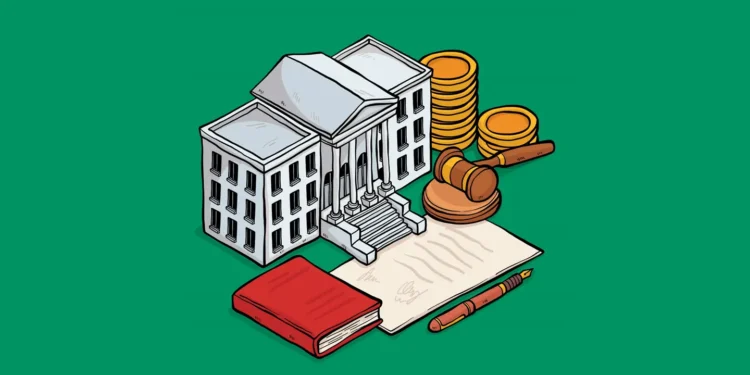On 22 April 2024, the Constitutional Court ruling officially legitimized Prabowo-Gibran’s victory as the elected president and vice president in the 2024 presidential election. One of their promises was to separate the Directorate General of Taxes (DGT) and Directorate General of Customs (DGCE) from the Ministry of Finance (MoF) through the establishment of an autonomous State Revenue Authority (BOPN). The establishment of BOPN is also included in the Government Work Plan for 2025.
One of the objectives of the establishment of BOPN is to increase tax revenue and to achieve the target of increasing the tax ratio by 10-12% by 2025. The main task of BOPN is as a state revenue collection that is still related to the Ministry of Finance, but structurally directly under the president.
The discourse on the separation of DGT from the Ministry of Finance through the establishment of the State Revenue Agency (BPN) has emerged since October 2014, but it was not implemented because its establishment requires changes to several laws.
In 2016, the narrative of DGT’s separation from the Ministry of Finance reemerged. Through the Academic Paper of KUP Bill 2016, the government wants to separate DGT from MoF through the establishment of BPN which is a semi-autonomous body. By law, the presence of BPN is possible because it is in accordance with Article 4 and Article 17 of the 1945 Constitution.
Problems of BOPN Establishment
In the journal “Impact of Semi-Autonomous Revenue Authority on Tax Revenue and Bouyancy: Evidence from Pakistan,” published in the Journal of Finance & Economics Research, noted that the establishment of the Federal Board of Revenue (FBR), which is an autonomous tax revenue body in Pakistan, did not have a significant impact on increasing the tax ratio. The reason is due to the lack of efficient management approach, weak governance system, too much political involvement, and most importantly, corruption. Therefore, if the establishment of BOPN is believed to increase the tax ratio in the near future, this is not necessarily the case.
The complexity of the problem also occurs in the administrative realm. In practice, the establishment of BOPN, whose duties and functions are no different from those of DGT, will only lead to cost overruns and tend to be a waste of time. Of course, the more than 40,000 employees of DGT and DGCE that must be consolidated to BOPN results in the amount of cost and time needed.
Of course, more than 40,000 DGT-DGCE employees must be consolidated into BOPN, which results in the cost and time required. The taxation law must also be amended again after the last revision in the Taxation Regulations Harmonisation Act, and the State Finance Law would also have to be amended.
Furthermore, if BOPN functions autonomously without clear restrictions on its authority, it will tend to be aggressive in its role in exercising its authority to collect state revenue. For example, in the United States (US), the Internal Revenue Service (IRS) acts aggressively in collecting taxes. Through Internal Revenue Code Section 7602, the IRS often uses the code as a procedure in obtaining taxpayer data/information in any form from banks.
If the aggressiveness of the IRS is replicated, in the near future it will raise concerns for investors to invest in Indonesia. However, on the one hand, many consider Internal Revenue Code Section 7602 as an aggressive policy, but on the other hand, this policy seems to be able to increase the tax compliance of US taxpayers, and is able to minimise tax evasion practices.
Without strict supervision, the establishment of a new institution with the authority of BOPN is also vulnerable to becoming a new field of corruption. In the book Internal Revenue Service (IRS) Historical Study: IRS Historical Fact Book: A Chronology 1646-1992, it was noted that in 1952, the majority of IRS employees were found to be involved in cases of corruption, tax evasion and bribery, which resulted in huge losses for the US. As a result, Henry S Truman (the US president at the time) carried out a major reorganisation and overhaul of the tax collection system by the IRS, such as decentralising many tax collection functions to district offices which replaced the function of collection offices.
Homework
There are several important homework to be done, three of the most crucial of which are the low tax ratio, low tax awareness and tax compliance, and the chaotic tax bureaucracy in Indonesia.
In the OECD report titled Revenue Statistics in Asia and Pacific 2022 (25 July 2022), Indonesia’s tax ratio is in the bottom third of 28 Asia Pacific countries in 2022. Indonesia’s tax ratio in 2023 will only reach 10.21%. As a country with a large gross domestic tax potential, the low tax ratio is certainly a colossal and prolonged homework.
Various methods have been used, from adjusting policies to reforming tax laws, but they have not significantly impacted the tax ratio. In the midst of the deadlock in efforts to increase the tax ratio, the issue of establishing a State Revenue Agency (BOPN) that is separate from the Ministry of Finance has emerged again and is considered an effort worth trying.
Furthermore, evidence of low public tax awareness is the implementation of tax amnesties twice, as well as the massive participation of people from upper economic groups. The Minister of Finance stated that taxpayers with assets of IDR 1 billion to IDR 100 billion are the majority of participants taking part in the tax amnesty. The level of tax compliance is also still low, as evidenced by data on taxpayers reporting SPT in 2022 only reaching 83.2%.
The limited space for the DJP, which only has the authority to make tax regulations limited to implementation rules, has become a trigger for chaos in the tax bureaucracy. For example, regulations and implementation regarding subjects, objects and rates must be carried out jointly by the Fiscal Policy Agency and other parties. This means that every initiative to create and/or change tax regulations will require a long bureaucratic process and take a long time before the regulations are implemented, meanwhile, the business world moves very quickly and dynamically.
The complexity of the problem requires the new government to find the right formulation to increase state revenues. Moreover, the fiscal fate of a country really depends on the efficiency and effectiveness of collecting and managing state revenues, as well as on how obedient citizens are in paying taxes.
There are several things that must be done if BOPN is formed in the future, including that BOPN must play an active role in increasing tax literacy among the public, with the hope of increasing tax awareness. After that, the formation of BOPN should be accompanied by tax policy reform that is oriented towards the simplicity of tax regulations. This simplicity is expected to reduce the high costs of tax compliance and increase taxpayer tax compliance.
Furthermore, at the beginning of its formation, the regulator must convince the public of the importance of establishing BOPN as a new breakthrough in increasing the tax ratio. Regulators must also seek support from various parties, especially support from business people, including taxpayers, so that the presence of BOPN is considered crucial for state revenues.
Although there is no guarantee that the presence of BOPN will increase Indonesia’s tax ratio in the near future, the formation of BOPN is worthy of being an alternative or solution that can be expected to help increase the tax ratio, increase tax awareness, and increase tax revenues.














